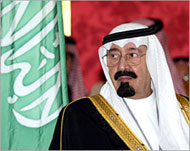Scepticism over proposed Saudi polls
Saudi Arabia is to hold its first ever elections in a move designed to show the world it is serious over political reform.

The kingdom – which has no freely elected officials, only appointees – announced on Monday its intention to organise an election to vote for municipal councils.
The announcement by the cabinet followed growing demands by reformists on de facto ruler Crown Prince Abd Allah to allow wider political participation, elections and freedom of expression.
However, London-based Saudi dissident Dr Muhammad al-Massari dismissed the announcement as “window dressing”.
“They are doing something now which was already in practice more than 100 years ago.
 |
|
Saudi Crown Prince Abd Allah bin |
“If we can be assured that the elections will be clean and fair some regions might benefit. The elections might ease corruption at municipal level and tie the hands of the princes who play real estate games.
Dismantled
“However, you have to remember there were elected assemblies in place until they were dismantled by the ruling family in the 1960s. Saudi was more advanced politically a century ago,” added Dr al-Massari.
The West has long regarded the kingdom – which runs an absolute monarchy – as very conservative. Monday’s development is seen very much by the West as an experiment in democracy.
The initiative towards a democracy has already been taken by neighbouring Gulf Arab countries.
The decision also coincided with the opening of the first human rights conference in Riyadh.
“The council of ministers decided to widen participation of citizens in running local affairs through elections by activating municipal councils, with half the members of each council being elected,” the state news agency SPA said.
Appease
It did not give further details, but seemed to imply that other members would be appointed by the government. It said preparations for the polls should not take more than one year.
Muhammad al-Harfy, a columnist in al-Watan daily, said he hoped the decision was not a one-off move to appease reform calls.
“I think this is a positive step because many people in our society have been calling for comprehensive elections, including municipal,” he told Reuters.
“But this is not enough. We hope these elections are a beginning and would lead to elections in the Shura Council, in universities and the right to form syndicates,” he added.
The cabinet statement said the decision “comes to implement King Fahd’s speech about widening popular participation and confirming the country’s progress towards political and administrative reform…and accountability”.
The king pledged in a speech in May to expand reforms, following bomb attacks on Western compounds in Riyadh.
Usama bin Ladin
The cabinet statement did not make clear whether women will be allowed to vote. Until now women are forbidden to drive and were only issued with identity cards in 2001.
The kingdom, under the dynastic rule of the house of Saud since its foundation in the 1930s, has an appointed advisory council, but has never had elections for public office.
Foreign and domestic pressure has been mounting on Saudi Arabia, birthplace of al-Qaida leader Usama bin Ladin, to speed up reform.
Saudi analyst Dawud al-Shiryan said the decision underlined the seriousness of the Saudi government.
“It was expected that the government would have started with small reforms such as administrative, bureaucratic and some economic, but to start with political reforms came as a surprise to many,” he said.